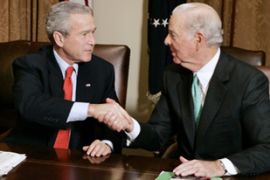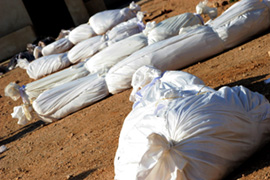Iraq report seeks 2008 withdrawal
The Iraq Study Group says the US also needs to engage with Iran and Syria.

Published On 7 Dec 2006
However, the White House said it had ruled out one-on-one talks with Iran about Iraq unless Tehran suspends its uranium enrichment activities.
Spokesman Tony Snow said: “It’s not clear … whether the report advocates one-on-one talks with Iran, there is talk about developing a support group.”
‘No magic formula’
The panel, co-chaired by James Baker, a former US secretary of state, said the main mission of US troops in Iraq “should evolve to one of supporting the Iraqi army, which would take over primary responsibility for combat operations”.
“The situation in Iraq is grave and deteriorating,” the five Republicans and five Democrats in the group said in the report.
“There is no magic formula to solve the problems of Iraq.”
Their unanimous recommendations are likely to carry weight with the US president, who has been under acute political pressure to change course in Iraq since parliamentary elections, when Bush’s Republicans lost control of both houses of Congress.
‘Rough waters’
At a press conference in Washington following the official release of the report, Lee Hamilton, the Democrat vice-chair of the panel, said:
| Q&A |
“Our ship of state has hit rough waters, it must now chart a new way forward.
“If the Iraqi government does not make substantial progress in achieving milestones … the US should reduce its military, political and economic support.
“The US must not make an open-ended commitment to keep large numbers of troops in Iraq.”
| Read the full document |
Baker said US policy “must be focused more broadly than on military strategy alone or on Iraq alone”.
He called on officials in Washington to seek the “active and constructive engagement of all governments that have an interest in avoiding chaos in Iraq – including all of Iraq’s neighbours.”
Questions raised
Some analysts thought it was unlikely that the White House would heed all of the report’s recommendations.
Mohamed el-Sayed Said, deputy director of the Ahram Centre for Political and Strategic Studies in Cairo, said the Bush administration was too hostile towards Syria and Iran to engage in serious talks now.
“Syria has shown signs it is willing to engage, but I don’t think the Bush administration is in a mood to do that with Syria and Iran.”
Marwan Kabalan, a political analyst at Damascus University, told Al Jazeera that a closer relationship with the US “would be a welcome development”.
 |
| Sectarian killing in Iraq is spiralling out of control |
“Syria has been saying that it is a key regional player. It could help by talking to its allies and friends in Iraq and could urge them to lay down their arms.”
Hoda Abdel-Hamid, Al Jazeera’s Iraq correspondent, says that the major question raised by the report is how Iraqi security services can be trained in time for the proposed withdrawal.
“Only about one-third of the army is capable of doing its job – the police are not capable of doing their jobs and have been infiltrated by militias.”
Violence continues
The conflict in Iraq, which is increasingly unpopular in the US, has lasted longer than US involvement in the second world war and killed more than 2,900 US soldiers and tens of thousands of Iraqis.
Hundreds of Iraqis are being killed in sectarian violence every week, raising debate over whether the country has descended into civil war and whether the US-backed government of Nuri al-Maliki, the Iraqi prime minister, can end the carnage.
In Baghdad on Wednesday fierce clashes erupted between armed Shia groups and residents of a Sunni neighbourhood in western Baghdad following a mortar barrage that wounded five people.
Mortar rounds fell on the central Midan district of the capital, killing 10 people and wounding 54.
Source: Al Jazeera, News Agencies